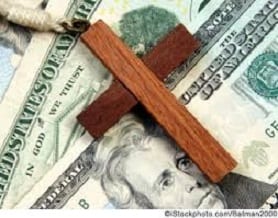There is nothing that attracts the ire of various commenters on this blog more than when someone perceives, rightly or wrongly, that I might be a socialist, one of those evil and frightening folks who suggest that we might need to do something about the radical inequities of wealth and privilege that confront us every day. Now, I freely admit that both my Christian faith and my natural liberal tendencies lean me more strongly in a communitarian direction than an individualistic one when the interests of the community and the individual are in conflict, so my critics’ perception is somewhat accurate.
But set the endless “capitalism vs. socialism” smackdown event aside for a bit. I have a question for those persons—and you are legion—who claim both to embrace the Christian faith and to be a committed devotee of free market capitalism. Are you a Christian Capitalist or a Capitalist Christian? This is not a matter of semantics, nor am I seeking to subject you to a lesson in grammar (or at least not much of one). Figuring out which of these you are will say a lot about your priorities. Let me explain.
If you claim to be both a “Christian” and a “capitalist,” the question is “which is the noun, and which is the adjective?” If you are a Christian (adjective) Capitalist (noun), your primary commitment is to free market capitalism—including all of its accompanying inequities—first and foremost. The “Christian” adjective means that you also are attempting to apply a Christian framework to your prior (and more fundamental) economic and political commitments. Good luck with that. This is the position of many commenters on my blog. The tortuous contortions they go through in order to explain how capitalism and Christianity are fully compatible would be amusing were they not so sad and tragic. I learned, for instance, from one recent commenter that Jesus actually was quite wealthy (what the three kings brought at his birth was worth a lot of money, after all); Jesus used this wealth to bankroll his disciples and followers during his three-year ministry. Really.
It is the Capitalist (adjective) Christian (noun), the person whose primary commitment is to her Christian faith, but who also wants to impose a capitalist framework on it, that I find more interesting. In preparation for a seminar with a bunch of sophomores last semester, I spent several days reviewing Pope Leo XIII’s 1891 encyclical “Rerum Novarum,” a highly influential discussion of labor and social justice. The 19th century was one of economic and political revolution, something that Leo is looking back on and attempting to place within what has come to be known as a classic expression of Catholic social teaching.
Perhaps because he knows that some of the heart of his encyclical sounds quite “socialist,” Leo is clear in the opening paragraphs that his message is not one of Communism. He argues that the ownership of private property is a divinely-given right, that attempts to enforce the collective ownership of property are a threat to basic institutions such as the family and the workplace, and that the primary reason people work is in order to support themselves and those dependent on them with the fruits of their labor. Unspoken, but also a likely reason for Leo’s rejection of socialism, is the reputation of atheism that—accurate or not—had been (and still is) often attached to Communism.
The meat of the encyclical is the enumeration of various duties that are owed, both by workers and their capitalist bosses, in the workplace. In a central passage, Leo attempts to thread the needle between private ownership of property and what is owed to those who do not have enough. Leo frames this discussion by citing Aquinas:
It is lawful, says St. Thomas Aquinas, “for a man to hold private property; and it is also necessary for the carrying on of human existence.” But if the question be asked: How must one’s possessions be used?—the Church relies without hesitation in the words of the same holy Doctor: “Man should not consider his material possessions as his own, but as common to all, so as to share them without hesitation when others are in need . . .”
This seems to be a case of the “Angelic Doctor” wanting to have his cake and eat it too, offering with one hand the individual, private ownership of property, then with the other hand taking it away by saying that said individual “should not consider his material possessions as his own.” Leo’s continues by trying to sort this apparent contradiction out.
No one is commanded to distribute to others that which is required for his own needs and those of his household . . . But, when what necessity demands has been supplied, and one’s standing fairly taken thought for, it becomes a duty to give to the indigent out of what remains over. It is a duty, not of justice (save in extreme cases), but of Christian charity—a duty not enforced by human law. But the laws and judgment of men must yield place to the laws and judgments of Christ . . .
Fully unpacking this would be an appropriate task for a full semester course, not for the concluding paragraphs of a blog post. But at the very least, Leo is providing important food for thought for the capitalist Christian, the person who wonders to what extent a commitment to free market capitalism might be compatible with a foundational commitment to following Jesus. The good news for the capitalist side is Leo’s point that the duty to “give to the indigent” cannot be “enforced by human law.” The not-so-good news for the individualist capitalist is that this duty is rooted, not in human law, but in the very roots of the Christian faith.
Capitalist Christians tend to describe the sharing of what remains after one has taken care of basic needs of self and family as “charity,” something that has come to mean “nice if you choose to do it, but not a necessary requirement of morality or faith commitment.” Not so, says Leo. The “duty to give to the indigent out of what remains over” is just that—a duty. It isn’t optional. It isn’t up to me, even though capitalism says that what I am giving is mine. It is a duty whose demands exceed anything that human law can enforce, a duty whose necessity is established by the very Christian faith I profess.
Aquinas himself says as much in a different passage when he considers what the “haves” owe to the “have nots.” He writes that “Whatever certain persons have in superabundance is due, by natural law, to the purpose of succoring the poor.” If you have more than you need, that extra literally does not belong to you. And in case you missed that, Aquinas then quotes Saint Ambrose, one of the most influential ecclesial figures in history: “It is the hungry man’s bread that you withhold, the naked man’s cloak that you store away, the money that you bury in the earth is the price of the poor man’s ransom and freedom.”
The tension between capitalism and Christianity could not be greater. Will you temper and adjust your faith in order to accommodate a hardcore commitment to free market capitalism? Or will you adjust your capitalist talking points in order to accommodate your commitment to the life of faith? That entirely depends on whether you are Christian capitalist or a Capitalist Christian. You decide.












